Mass Senate pushes for free community college
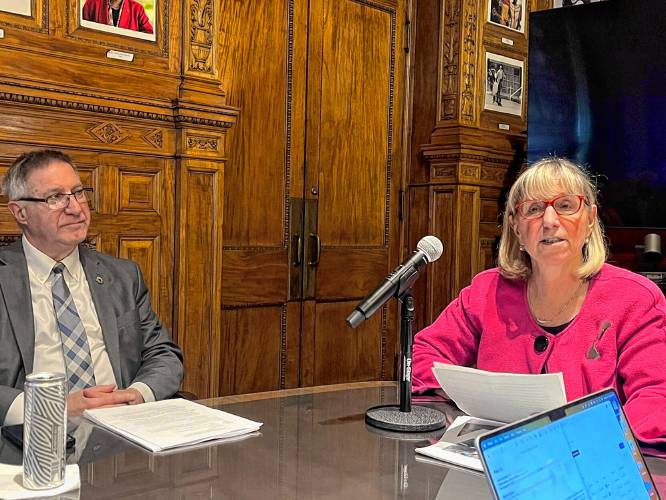
Senate President Karen Spilka, right, and Senate Ways and Means Chair Michael Rodrigues discuss a new report about making community college free for all. STATE HOUSE NEWS SERVICE
| Published: 01-11-2024 5:58 PM |
BOSTON — “Keep your eyes peeled” for free community college funding in the Senate’s version of the fiscal year 2025 budget, Senate President Karen Spilka said Wednesday.
Making community college free for every Massachusetts resident could cost the state about $170 million annually, according to a new report by Boston Consulting Group on behalf of the Massachusetts Association of Community Colleges. The report was rolled out to reporters Wednesday at a news conference with Spilka, Senate Ways and Means Chairman Michael Rodrigues and Higher Education Committee Chair Sen. Jo Comerford, D-Northampton.
The Senate president has said that she hopes to make the state’s 15 community colleges free for all by the fall of 2024, but her goal may be affected by the state’s changing fiscal environment. The fiscal year 2024 state budget already deployed $20 million to cover any unmet community college costs for students 25 and older without a college degree.
For Comerford, who is the lead sponsor of the Cherish Act, legislation that would enable students to graduate from public higher education debt-free, the possibility of universal free community college education is an issue of equity.
“This is one of the ways we build back from the COVID pandemic equitably,” Comerford said in a phone interview Thursday.
Comerford said Massachusetts, through meaningful investment in public higher education, can take a leap ahead in tackling college affordability and expand access to higher education. She said she and her team will be among those spending time determining the most transformative steps that can be taken in the next legislative session, based on the interim report.
“This important report offers us pathways forward to make community college free for all and to do so in a way that ensures student success, supports staff and faculty, is fiscally sustainable, maximizes the benefits to our commonwealth and offers Massachusetts residents a world-class education,” Comerford said.
Comerford said the biggest challenge is doing it right. The model she is looking at mostly closely is a tiered middle model, with wraparound services that will be provided so the students can persevere, with support from professionals including peer mentors and mental health clinicians, along with child care and food support.
Article continues after...
Yesterday's Most Read Articles
 More than 130 arrested at pro-Palestinian protest at UMass
More than 130 arrested at pro-Palestinian protest at UMass
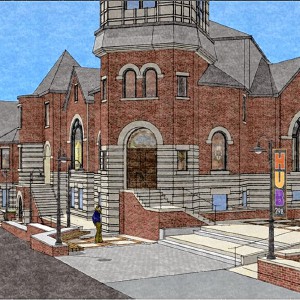 Public gets a look at progress on Northampton Resilience Hub
Public gets a look at progress on Northampton Resilience Hub
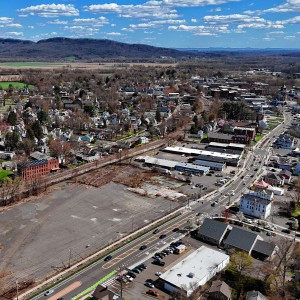 Northampton bans auto dealerships near downtown; zone change won’t affect Volvo operation on King Street
Northampton bans auto dealerships near downtown; zone change won’t affect Volvo operation on King Street
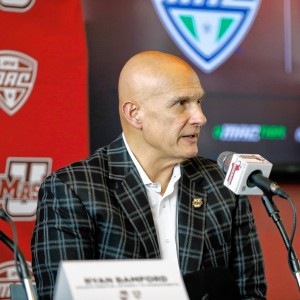 UMass basketball: Bryant forward Daniel Rivera to be Minutemen’s first transfer of the offseason
UMass basketball: Bryant forward Daniel Rivera to be Minutemen’s first transfer of the offseason
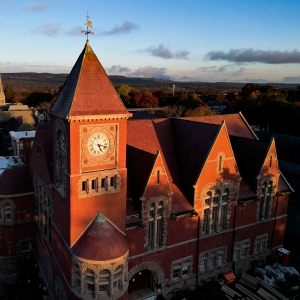 Town manager’s plan shorts Amherst Regional Schools’ budget
Town manager’s plan shorts Amherst Regional Schools’ budget
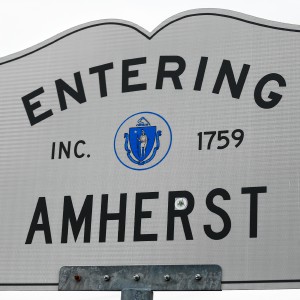 Police respond to alcohol-fueled incidents in Amherst
Police respond to alcohol-fueled incidents in Amherst
“If we are able to commit to this, this will be the biggest of game-changers for families,” Comerford said. Comerford explained that getting more folks an education that they need without debt will allow them to get the jobs they want and to thrive economically. This cycle of having good-paying jobs for people entering the workforce will then mean higher tax revenues for the state to continue the investment.
The report’s release comes, though, as Gov. Maura Healey announced earlier this week that she was making budget cuts after six consecutive months of below-projection tax receipts.
Budget writers will also have less wiggle room in their next budget, after lawmakers and administration officials estimated the state would bring in less general revenue in fiscal 2025 than they had originally built the fiscal 2024 budget on.
Asked if the announcement of budget cuts and disappointing revenues would undermine Spilka’s plan, she replied: “Those of us who have been in the State House a long time, you realize all revenue is cyclical.”
“We believe that, again, this is affordable, she said.
“And we believe that this is a way to grow our state revenue to not only afford this but many other programs and services that our residents want and deserve.”
Comerford said senators will need to find common ground with the House and work collaboratively with Healey and Lt. Gov. Kim Driscoll.
The report suggests that the program could be funded through revenue from the 4% surtax on household income above $1 million, which voters passed in 2022, with revenue to be used exclusively for education and transportation initiatives.
The state spent $1 billion of that new funding this year, about half of which went to education programs. They’re anticipating spending $1.3 billion from the surtax in fiscal 2025 — meaning the free community college initiative could take up about 26% of newly available education dollars, if budget writers decide to split the fund about evenly between education and transportation spending again.
James Vander Hooven, president of Mount Wachusett Community College, said the initiative addresses key barriers to for students.
“For 25 years, I have worked to enable success of our students at the community college level, and what ends up being the obstacle is not the academic work in most cases. It’s what the student is dealing with in their family lives, in their personal lives, whether they have food security issues, whether they have housing insecurity, whether they have child care, dependable child care, and the list goes on,” Vander Hooven said. “This step ... in the area of equity is going to be transformational.”
It was a similar argument that was made for Healey’s MassReconnect program, which this year made community college free for everyone older than 25 who do not have a college degree. That program cost the state $20 million in fiscal 2024, covering last-dollar costs that were not already paid for by federal or state financial aid.
Lawmakers and Healey also financed a new program in fiscal 2024 for free tuition for nursing students at community colleges across the state, amid health care workforce shortages that have significantly impacted the industry and access to care.
Greenfield Community College President Michelle Schutt said MassReconnect and the nursing tuition program has led to a 15% increase in enrollment— turning around a 13-year decline.
“It has given so much hope to my community that simply was struggling and questioning how education fit into western Massachusetts,” Schutt said.
Staff writer Scott Merzbach contributed to this story.

 State Senate budget funds free community college for all
State Senate budget funds free community college for all ‘We can just be who we are’: Thousands show support for LGBTQ community at Hampshire Pride
‘We can just be who we are’: Thousands show support for LGBTQ community at Hampshire Pride Doors open at Tilton Library’s temporary home at South Deerfield Congregational Church
Doors open at Tilton Library’s temporary home at South Deerfield Congregational Church Area property deed transfers, May 2
Area property deed transfers, May 2
